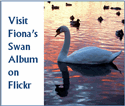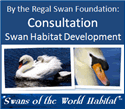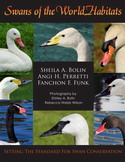Ask the Swan Specialist
Date: 16 August 2010
Hi Sherry:
1. 9 Carp should not be a problem unless they are extremely huge which may be scaring the swans. A large mouth bass and even carp may eat cygnets (baby swans), ducklings and goslings even unintentionally, just because of the large mouth size. So, this would be a consideration if you do have small birds. However, you do need an aerator on the pond to prevent algae growth and botulism which can kill the swans and basically, fish and other birds. You also need to have a means to refill the lake in the event of an major drought which will also cause the botulism conditions. As far as the carp, they will keep down a major part of the grass in the areas that the swans cannot feed and this is a good thing because you won't have to spray chemicals in the lake to rid it of the grasses. Should vegetation start being sparse, then you may need to remove some of the carp, but people keep carp and talapia on many of the lakes which have swans.
2. Having to find the swans because they are walking away is not a good thing. This will allow opportunistic predators, coyotes, foxes and domestic animals, etc. to kill the birds. NOTHING IS NOCTURNAL if it is hungry and can find a quick meal. You need to inhibit their area of walking by maybe fencing in the location that allows them to leave the immediate area from your view. Since we have not seen your property and pond, we can't offer advice on how to fence.
3. You cannot tell if a swan is a male or female by size. One of the swans may have been a runt to begin with or had something stunt its growth during the maturation stage. You will need to have an avian veterinarian with experience in waterfowl sex the bird. You may also be able to submit a feather or blood test for DNA Sequencing which will give you a true result. Sexing is not reliable until after 1 year of age because the genitals are not mature. Even then, you might be surprised during nesting season which will be the truest test of all! The birds are too young to consider pairing at this time and are looking around on their own, so this is why you see them by themselves. Even as mates, older birds will want time out to themselves.
4. Allowing the two birds to nest, lay eggs and hatch will not provide any genetic anomalies at this time. Maybe, several years down the road you might see something, but this is not a major concern with swans, even most birds. However, in-breeding is a major concern with mammals. You do need to check to see if you need a permit to raise the cygnets. A 2 acre pond will probably hold 4 swans (at the most) and you will have major issues with these pairs once nesting season begins. All cygnets will be chased from the pond prior to the next nesting season and a mute swan can have 1-13 cygnets a year. You will need to have a game plan on where these cygnets will go should they all hatch and live. This is why you may need a permit because eventually, you will need to get rid of the cygnets in order to keep the original pair.
5. Individual swans and species of swans determine if they are geese chasers. Some swans get along with geese and others do not. So, there is no way of telling until nesting season which is usually when the swans change personalities quickly.
6. Innate behavior will tell the swans how to raise cygnets. They may practice mating and have an egg or two the first year. If they are really good parents and learn fast, the first eggs will be raised to adulthood. However, this is not usually the case, the first hatchings are practice and may perish because the young birds do not know what to do, but will learn quickly the next breeding season. The Regal Swan
Messages In This Thread
- "land" swans -- sherry tyndall -- 7 August 2010
- Re: "land" swans -- sherry tyndall -- 15 August 2010
- Re: "land" swans -- The Regal Swan -- 16 August 2010
- Re: "land" swans -- The Regal Swan -- 7 August 2010
- Re: "land" swans -- sherry tyndall -- 15 August 2010
Ask the Swan Specialist is powered by
Tetra-WebBBS 5.30 Beta © 2006-2007 Tetra-Team






